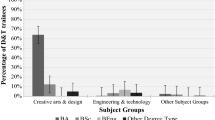Abstract
Engineering Graphics and Design is a technological subject which is offered in the Bachelor of Education degree from third to fourth year of the degree course. Fourth year pre-service teachers find EGD difficult to teach because of various reasons. Therefore the aim of the paper was to investigate fourth year pre-service teachers’ pedagogical content knowledge gaps in teaching EGD during their teaching practice. The study was conducted using a qualitative approach and eight pre-service teachers were purposefully selected to take part in the study. Findings of the paper found that pre-service teachers found teaching practice very short to do all the teaching tasks that is required of them. Some pre-service teachers did not have drawing models to make learning concrete to their learners. Assessment was done partially just to impress the university tutors and to conform to the schools’ rule and not to evaluate the learners’ understandings and their teaching.

Similar content being viewed by others
References
Bogdan, R. C., & Biklen, S. K. (2003). Qualitative research for education: An introduction to theory and methods. Cape Town: Pearson.
Bucat, R. (2004). Pedagogical content knowledge as a way forward: Applied research in chemistry education. Chemical Education Research and Practice, 5, 215–228.
Cowie, B., Moreland, J., Jones, A., & Otrel-Cass, K. (2008). The classroom InSiTE project: Understanding classroom interactions to enhance teaching and learning in science and technology in years 1–8. Wellington: Teaching and Learning Research Initiative, New Zealand Council for Educational Research.
De Jong, O., Veal, W. R., & van Driel, J. H. (2002). Exploring chemistry teachers’ knowledge base. In J. K. Gilbert, O. De Jong, R. Justi, D. Treagust, & J. H. Van Driel (Eds.), Chemical education: Towards research-based practice (pp. 369–390). Dordrecht: Kluwer Academic Publishers.
Department of Education. (2011). Curriculum and assessment policy statement grades 10–12. Engineering graphics and design. Pretoria: Government Printers.
Descombe, M. (2007). The good research guide for small-scale research projects. Maidenhead: University Press.
Geddis, N., Onslow, B., Beynon, C., & Oesch, J. (1993). Transforming content knowledge: Learning to teach about isotopes. Science Education, 77, 575–591.
Hashweh, M. Z. (2005). Teacher pedagogical constructions: A reconfiguration of pedagogical content knowledge. Teachers and Teaching, 11, 273–292.
Khoza, S. D. & Makgato, M. (2013). Students’ difficulties in sectional drawing: A case of student teachers in the Eastern Cape University. SAARMSTE Conference proceedings. Western Cape. South Africa.
Kind, V. (2009). Pedagogical content knowledge in science education: perspectives and potential for progress. Studies in Science Education, 45(2), 169–204.
Letts, L., Wilkins, S., Law, M., Stewart, D., Bosch, J., Westmorland, M. (2007). Guidelines for critical review form: Qualitative studies (version 2.0). Available http://www.Mcmaster.
Loughran, J. J., Berry, A., & Mulhall, P. (2006). Understanding and developing science teachers Pedagogical content knowledge. Rotterdam: Sense Publishers.
Loughran, J., Mulhall, P., & Berry, A. (2004). In search of pedagogical content knowledge in science: Developing ways of articulating and documenting professional practice. Journal of Research in Science Teaching, 41, 370–391.
Magnusson, S., Krajcik, J., & Borko, H. (1999). Nature, sources and development of pedagogical content knowledge. In J. Gess-Newsome & N. G. Lederman (Eds.), Examining pedagogical content knowledge: The construct and its implications for science education (pp. 95–132). Dordrecht: Kluwer Academic Publishers.
Opie, C. (2004). Research procedures. In C. Opie (Ed.), Doing educational research (pp. 95–129). London: Sage Publications.
Rollnick, M., Bennett, J., Rhemtula, M., Dharsey, N., & Ndlovu, N. (2008). The place of subject matter knowledge in pedagogical content knowledge: A case study of South African teachers teaching the amount of substance and chemical equilibrium. International Journal of science Education, 30, 1365–1387.
Shulman, L. (1987). Knowledge and teaching: Foundations of the new reform. Harvard Educational Review, 57(1), 1–22.
Shulman, L. S. (2002). Making differences: A table of learning. Change, 34, 36–44.
Stake, R. (1995). The art of case study research (pp. 49–68). Thousand Oaks, CA: Sage.
Acknowledgments
The author thanks the fourth year students doing bachelor of education in a Johannesburg university for taking part in this research.
Author information
Authors and Affiliations
Corresponding author
Ethics declarations
Conflicts of interest
The author declares that he has no conflict of interest.
Compliance with ethical standards
This is to confirm and declare the manuscript entitled ‘Identifying the Gaps of Fourth Year Degree Student Teachers’ Pedagogical Content Knowledge in Teaching and Learning Engineering Graphics and Design’ has not been submitted elsewhere; has not been published elsewhere; and also the manuscript has not been included as a fully reviewed paper in any conference proceedings. The revised manuscript as requested is attached.
Rights and permissions
About this article
Cite this article
Khoza, S.D. Identifying the gaps of fourth year degree pre-service teachers’ pedagogical content knowledge in teaching engineering graphics and design. Int J Technol Des Educ 27, 537–548 (2017). https://doi.org/10.1007/s10798-016-9363-2
Accepted:
Published:
Issue Date:
DOI: https://doi.org/10.1007/s10798-016-9363-2




